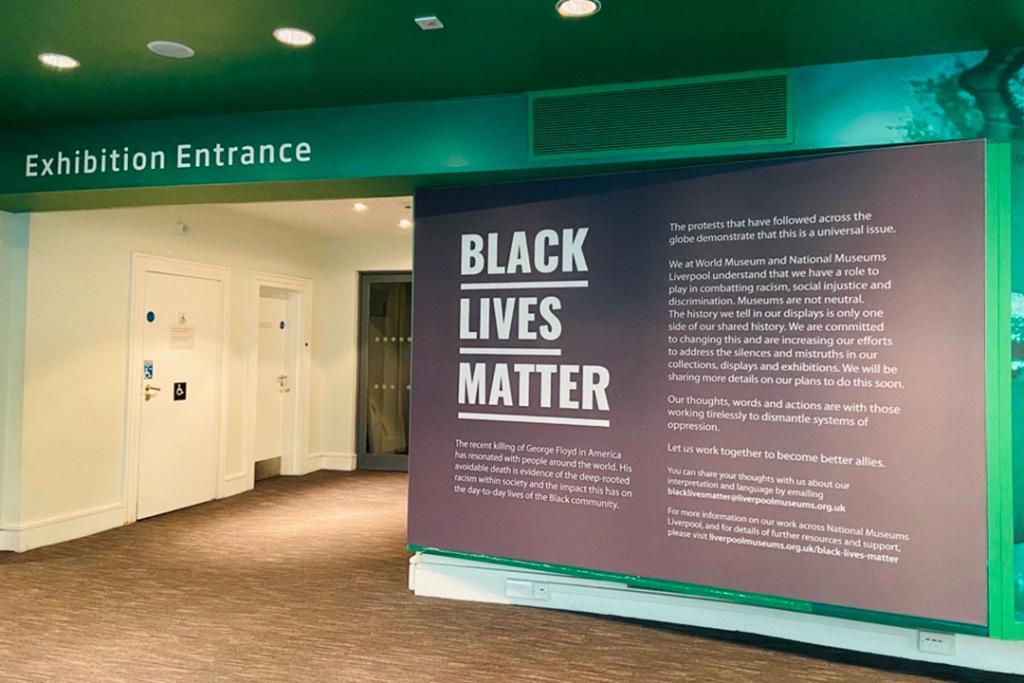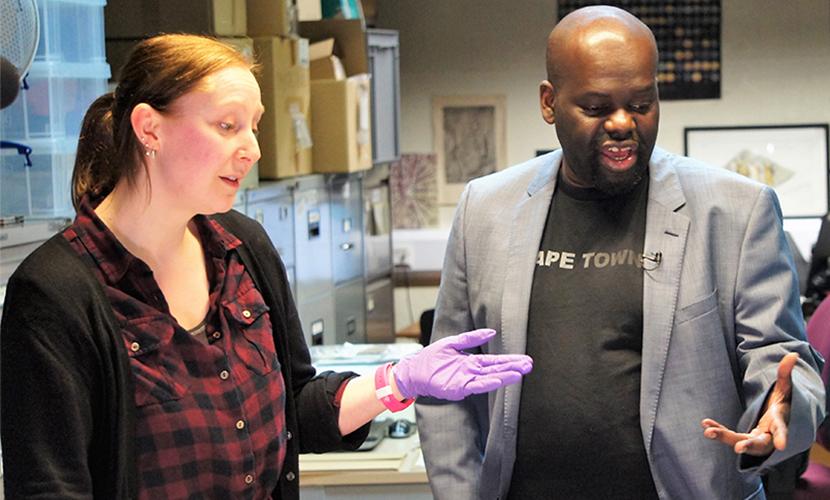What next in light of Black Lives Matter – two months on
Director Laura Pye reflects on the past two months, looking at the impact of the Black Lives Matter movement and how National Museums Liverpool is responding.

It is just two short months since I published my last piece, reflecting on the death of George Floyd and what this moment meant for us at National Museums Liverpool. We have since seen how Black Lives Matter protests have swept all corners of the world, statues toppled, chokeholds banned, Liverpool street names contested and even a call for a National museum dedicated to Slavery in London. We have witnessed some of the most engaging, passionate and determined anti-racist actions – and conversations that were long overdue – from Minnesota to Liverpool.
In the reflection piece, posted in June, I talked about the things NML was already engaged in, and the ambitions we had for the future. We are determined to put our words into actions to make lasting change and hold ourselves accountable for our short fallings.
Today, as we mark the anniversary of Anthony Walker, whose life was devastatingly cut short in a racist attack near his home in Merseyside, I thought it appropriate to share what steps we have taken across our organisation in our ongoing commitment to challenge racism, prejudice, discrimination and inequality. Some are less visible changes, which are harder to measure, but vital to our long-term work. I also want to share what I have learnt from the last two months through discussions and reflection, and be clear about what more we need to do together.
In the weeks that followed the death of George Floyd, there was a flurry of activity. As we watched the Colston statue be pulled down in Bristol and read articles calling for the very thing we have here in Liverpool - an International Slavery Museum - our colleagues within the museum and in our PR & Communications team were kept very busy. I am sure you would all agree with me that they did an incredible job in ensuring we were engaged in the discussion and in raising our profile, but it's really important we remember that Black Lives Matter is an NML wide issue and isn't just about the International Slavery Museum, so it's been great to see the work which has also been happening over the past few months across the whole organisation.
We have continued important pieces of work across the venues to address the issues around representation within our displays and collections, and whilst we still have more to do, this work is translating into real changes within our galleries. The Museum of Liverpool has started a new project to collect objects telling the story of the Black Lives Matter protests in Liverpool; the Walker Art Gallery has committed to being more transparent about the links between the collections and the Transatlantic Slave Trade and has already included additional interpretation to some paintings; the #WMWhereNext project at World Museum aimed at exploring new and more transparent interpretation of our World Cultures Gallery has continued at pace and we have been engaged in discussion with partners in Port Sunlight and Unilever about Lord Leverhulme’s involvement in the Congo.

Assistant Curator Alex discussing objects from our World Cultures gallery with Daliso Chaponda in the museum store.
On top of this, as we reopen our Museums and Galleries, we have installed large panels within our public spaces which outlines our commitment to #BLM and we have issued a dedicated email address for the public to get in touch with us about the work we do around Black Lives Matter – this can be anything from a question they may have, or something they have seen in our display that might need added interpretation. We want that honest and transparent dialogue with our audiences.
Internally, a group has been brought together to look at issues relating to Black Lives Matter, which includes all our department leads and members of our BAME staff group, as well as Leadership team colleagues. This group has met a number of times, discussed issues and concerns, listened to external speakers about ensuring inclusion across organisations, and worked on producing action plans for each team to address some of the issues and concerns raised. Those action plans will be assimilated into our core action plans for each team to ensure it is embedded into our work, but we will also pull together key actions in a charter which we will publish soon.
In the piece I wrote in June, I also talked about our plans for the development of the International Slavery Museum, and over the last two months things have continued to move forward here. We have been involved in discussion with both Liverpool City Council and the Liverpool City Region as well as with DCMS and I am pleased that the project features in both the City Council and the combined authority's recovery plans.
We got a huge amount of support following the Guardian article calling for a national museum focused on slavery, with hundreds of people highlighting that there already was one – doing great things! Since then, I have been in touch with a number of other museums and archives across the UK, such as Hull, Glasgow, Bristol and London to arrange a discussion between us all to focus on how we highlight the great work, which is already being done. A fraction of the funding a new museum would cost could be used to support what we already have across the UK and would make a real difference.
I also mentioned our commitment to being the most representative museums in the UK, and I have been giving this a lot more thought. Work is already ongoing with the Thrive team and HR around our recruitment processes, but I am keen to understand more about the experiences of being a BAME colleague in NML.
Over the past few weeks, I have been speaking on a one to one basis with some ex-colleagues to learn from their experience. I have also heard from some current BAME colleagues privately about their thoughts and ideas for improvement, which has been invaluable. These discussions have been difficult and uncomfortable at times, but I believe only by fully understanding the issue will we be able to make tangible changes for our future colleagues. I would welcome more discussions from any colleagues who have a view to share; if you are keen, please drop me a line and I will arrange something.
We still have much more to do and I personally have much more to learn. I always remember the event that Museum Detox ran at the Museums Conference in Manchester, focused on understanding my white privilege, and recently I have joined Laurence Westgaph on one of his Slavery Tours around the city. Just because we weren’t taught this history at school is no excuse for us not educating ourselves on it now. There are some great resources on our website, notably on the Black Lives Matter resource page we have created, and I am personally enjoying reading Brit(ish) by Afua Hirsch.
So, as we move forward, I would encourage you all to keep talking and listening to each other, keep learning and keep holding me and NML accountable. More is needed to uproot the racism and racial bias that is so embedded in our nation’s economic, social and political system. Anthony Walker, George Floyd, Stephen Lawrence, Breonna Taylor were people, not an idea. Our statements are worthless unless they are followed up with actions, and I hope what we have achieved over the last few months is the start of lasting change.
